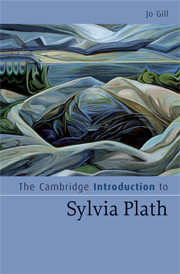Book contents
Summary
In the opening line of her engaging essay on Sylvia Plath, critic Sandra M. Gilbert explains, ‘Though I never met Sylvia Plath, I can honestly say that I have known her most of my life.’ The familiarity that Gilbert reports is one that many readers of Plath share. The bare facts of her life come to us from multiple sources – from her Journals and Letters Home, her stories and prose essays, her novel, The Bell Jar, and of course from the poems themselves. Beyond this, we pick up clues and information from biographies and memoirs, from critical commentaries and, of late, from other people's poems (notably Ted Hughes's 1998 Birthday Letters) or fiction (Kate Moses's 2003 Wintering) or film (Christine Jeffs's 2003 Sylvia). From these fragments we construct what we believe to be the biographical truth. We learn something, too, from the broader cultural, historical and ideological circumstances in which Plath lived and wrote; as Stan Smith puts it, ‘For Sylvia Plath … identity itself is the primary historical datum: the self is a secretion of history.’
Plath's life, then, seems overdetermined. It is told to us over and over again (indeed, she tells it to herself over and over again, rehearsing certain moments in multiple genres) in so many overlapping layers that it seems, finally, to form a kind of carapace – a papier-mâché shell which masks a gap. Biographical accounts of Plath's life have, as Chapters 6 and 7 will show, been bitterly contested.
Information
- Type
- Chapter
- Information
- The Cambridge Introduction to Sylvia Plath , pp. 1 - 13Publisher: Cambridge University PressPrint publication year: 2008
